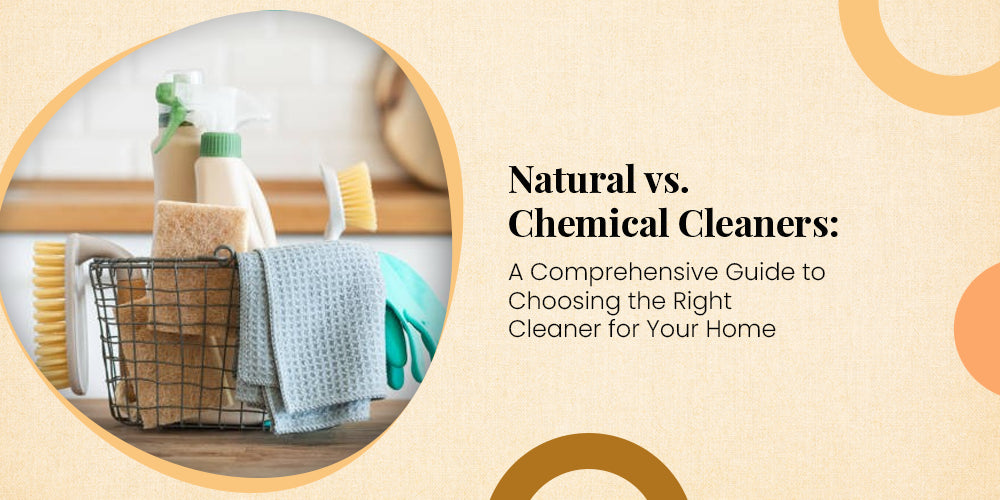Natural vs. Chemical Cleaners: A Comprehensive Guide to Choosing the Right Cleaner for Your Home

Keeping your home clean is important, but choosing the right cleaner can be tricky. The debate between natural vs. chemical cleaners is ongoing, and it’s essential to weigh the pros and cons of each. Natural cleaners, derived from plants and minerals, offer eco-friendly and non-toxic options, while chemical cleaners are powerful and effective but may pose health risks. Understanding the benefits of both will help you make an informed choice for your household. In this blog, we’ll explore the differences, benefits, and which type of cleaner suits your lifestyle best. Whether you prefer natural or chemical cleaners, this guide will help you choose the right solution for a healthier, cleaner home.
What Are Natural Cleaners?
Natural cleaners come from sources like plants, minerals, and essential oils, offering a safer alternative to chemical-based products. These cleaners avoid synthetic chemicals, making them environmentally friendly and less harmful to humans and pets. They are perfect for those seeking a greener cleaning solution.
Common Ingredients in Natural Cleaners
- Baking soda: Known for scrubbing away grime and deodorizing surfaces.
- Vinegar: A natural disinfectant and powerful stain remover.
- Essential oils: Offer antibacterial and antifungal benefits, with a refreshing scent.
- Lemon juice: Cuts through grease and lifts stubborn stains naturally.
Natural cleaners provide an eco-friendly way to maintain a clean, healthy home.
What Are Chemical Cleaners?
Chemical cleaners are made with synthetic compounds specifically designed to tackle tough stains and bacteria with speed and efficiency. They are often highly effective but can come with safety precautions, especially in homes with children or pets. While powerful, these cleaners may pose risks if not used properly.
Common Ingredients in Chemical Cleaners
- Bleach: A potent disinfectant that kills germs and whitens surfaces.
- Ammonia: Excellent for cleaning glass and leaving shiny surfaces streak-free.
- Phosphates: Found in laundry detergents to boost cleaning performance.
- Parabens and sulfates: Commonly used for foaming and preserving cleaning agents.
Chemical cleaners deliver quick results but may require careful handling.
Pros and Cons of Natural Cleaners
Pros:
- Environmentally friendly: Natural cleaners are biodegradable, meaning they break down easily without harming the environment or contributing to pollution. This makes them a great choice for eco-conscious households.
- Safe for children and pets: Since natural cleaners don’t contain harsh chemicals, they are generally safer to use around children and pets, reducing the risk of accidental exposure.
- Non-toxic: With no harsh chemicals, there’s less chance of inhaling toxic fumes or experiencing skin irritation, creating a healthier home environment.
- Cost-effective: Ingredients like baking soda and vinegar are affordable and commonly found in most homes, making natural cleaning more budget-friendly.
Cons:
- Slower action: Natural cleaners might take longer to show results, especially when dealing with tough stains or grime.
- Limited range: They may not be suitable for heavy-duty disinfecting or tackling stubborn messes.
- Short shelf life: DIY or natural cleaners tend to spoil faster due to a lack of preservatives, meaning frequent re-preparation is often necessary.
Natural cleaners offer great benefits, but they may require a bit more patience and effort.
Pros and Cons of Chemical Cleaners
Pros:
- Highly effective: Chemical cleaners are known for their quick action. They can easily cut through tough stains, grease, and grime, making them ideal for deep cleaning tasks.
- Wide availability: You'll find a vast array of chemical cleaning products in most stores, each designed to target specific issues like bathroom mildew or kitchen grease.
- Disinfectant properties: Many chemical cleaners come with potent disinfecting power, eliminating harmful bacteria, viruses, and other pathogens. This makes them ideal for homes requiring high levels of sanitation, such as after illness.
Cons:
- Harmful to health: Prolonged or repeated exposure to certain chemicals can lead to respiratory issues, skin irritation, or even allergic reactions, especially in sensitive individuals.
- Environmental impact: Many chemical cleaners contain non-biodegradable ingredients, which can contribute to water and soil pollution, harming ecosystems.
- Harsh fumes: The strong odours from chemical cleaners can be overpowering and require proper ventilation, which can be inconvenient during colder months.
- Safety concerns: With toxic ingredients, chemical cleaners pose risks to households with children or pets, requiring careful storage and use.
While effective, chemical cleaners come with trade-offs that warrant careful consideration.
Safety Considerations: Natural vs. Chemical
When comparing natural vs. chemical cleaners, safety should always be a top priority.
For Families:
Natural cleaners are often the best choice for homes with young children or pets. These cleaners are generally gentler, which means they pose a lower risk of accidental ingestion or skin irritation. You can clean your home with peace of mind, knowing that these natural options are less likely to harm your loved ones.
On the flip side, chemical cleaners, while effective, require extra precautions. It’s vital to store them out of reach of children and pets, and always follow the safety instructions on the label to prevent accidents.
For Individuals with Allergies:
Natural cleaners typically lean towards hypoallergenic formulas, especially those free from added fragrances and harsh chemicals. This makes them a smart choice for sensitive individuals. However, chemical cleaners can often trigger allergies or asthma attacks due to their strong ingredients. So, if you have sensitivities, opting for natural cleaners could be the safer route.
Environmental Impact of Cleaners
One of the most significant differences between natural vs. chemical cleaners is their effect on the environment.
Natural Cleaners:
- Biodegradable: Natural ingredients break down easily and don't contribute to environmental toxicity.
- Less water pollution: When rinsed down the drain, natural cleaners are less likely to harm aquatic life.
Chemical Cleaners:
- Water contamination: Chemical residues can pollute water sources, harming marine ecosystems.
- Non-biodegradable: Certain chemicals, like phosphates, persist in the environment, causing long-term pollution.
Comparing the Cleaning Power: Do Natural Cleaners Work as Well?
When it comes to effectiveness, natural vs. chemical cleaners offer different strengths.
Effectiveness on Grease:
Chemical cleaners shine in removing tough grease and grime. Their fast-acting formulas make them ideal for kitchen messes. Natural cleaners, like vinegar or baking soda, do work on grease but often require more scrubbing and patience to achieve similar results.
Effectiveness on Germs:
Chemical disinfectants, such as bleach and ammonia, are unmatched in killing bacteria and viruses. Natural alternatives, like vinegar and essential oils (tea tree or eucalyptus), can also fight germs, but they may not be as powerful for heavy-duty disinfection tasks.
When to Choose Natural Cleaners
Knowing when to choose natural vs. chemical cleaners can make a significant difference in your home.
- Daily cleaning: For everyday tasks like surface cleaning, dusting, and maintaining a fresh atmosphere, natural cleaners are often sufficient. They leave your home smelling great without harmful chemicals.
- Sensitive spaces: When cleaning areas like nurseries, pet zones, or bedrooms, opt for non-toxic natural products. This choice keeps your loved ones safe from harsh substances.
- Eco-conscious households: If reducing your environmental footprint is a priority, natural cleaners are the way to go. They’re biodegradable and won’t contribute to pollution, making them a responsible choice for a cleaner planet.
When to Opt for Chemical Cleaners
There are times when chemical cleaners shine, making them the go-to option for specific cleaning tasks.
- Deep cleaning: If you're diving into deep cleaning, like disinfecting bathrooms or kitchens, chemical cleaners can be more effective. Their powerful formulas tackle built-up grime and bacteria.
- During flu season: When flu season hits, quick germ-killing is essential. Chemical disinfectants provide that reliable punch needed to eliminate viruses and protect your family.
- Tough stains: For pesky problems like grease, hard water stains, or mildew, chemical cleaners are your best bet. They work faster, saving you time and effort when dealing with those stubborn spots.
Finding the Balance
Choosing between natural vs. chemical cleaners ultimately depends on your priorities and cleaning needs. Natural cleaners offer a safer, eco-friendly option for daily tasks, ensuring a clean space without harmful chemicals. On the other hand, chemical cleaners excel at tackling tough stains and disinfecting areas like kitchens and bathrooms. To create a balanced approach, consider using natural cleaners for routine maintenance and saving chemical cleaners for deeper cleaning sessions. By strategically incorporating both types, you can enjoy a clean, safe home while maintaining effectiveness and safety. So go ahead, mix and match for the best results!
SHARE:





